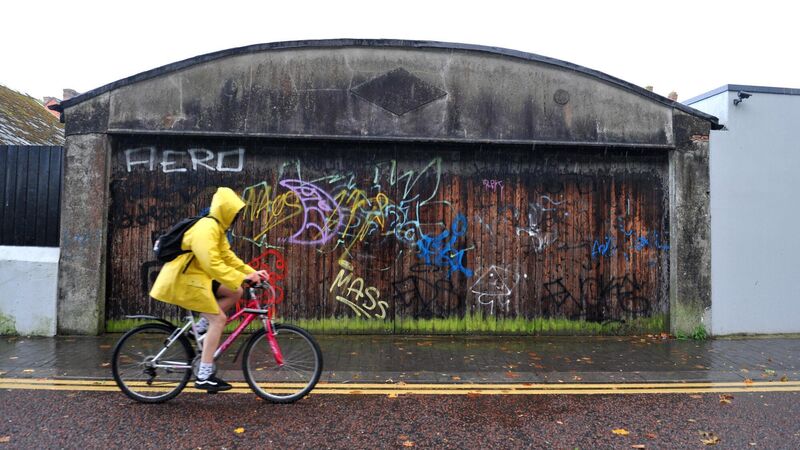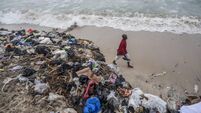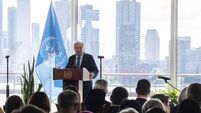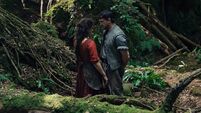Michael Moynihan: Everyone should feel safe on streets and footpaths of our cities

A cyclist passing a doorway covered in grafitti at Mardyke Walk in Cork city. Bike enthusiasts have had to battle with parked cars on their trips.
November makes it pretty real, doesn’t it?
You can cod yourself through October but the eleventh month gives it to you straight. Rain. Wind. Cold.
This is going to be a different winter in Cork for quite a few reasons, though, with the shadow of the ‘rona falling across us.
Some things don’t change, but that’s for later.
The virus is driving the trend for al fresco dining, for instance, and while that may not exist in our current situation, level five, it will surely return when our levels go down, with places like Princes Street bedecked with tables and chairs once again.
I wasn’t aware until I looked into this that taking to the open air was a favoured tactic in the Spanish flu pandemic a century ago — in some parts of the United States at that time court hearings were conducted out in the open — literally — to prevent the disease spreading in crowded courtrooms (I’m sure this paper’s courts correspondent, Liam Heylin, would welcome such a development).
There’s an obvious difference in climate, though, between somewhere in the middle of Cork and the sunnier parts of America — or even the likes of Paris, where it’s estimated that almost three-quarters of cafes have some form of terrace seating arrangement.
What I (also) wasn’t aware of until recently was the amount of power used by those large-scale heating lamps beloved of establishments newly converted to the outdoor experience. Some are highly wasteful and leave a depressingly destructive carbon footprint: should we be willing to shiver a little more and save the planet a little pain?
Consider it a corona-choice.
The change in season also focuses attention on another recent phenomenon — the increased interest in cycling around the city, which arose out of the earlier, near-total lockdown in the spring.
However, may I enter in evidence the new cycle lane stretching down the Centre Park Road, one which seeks to link the city centre and its outskirts with the successful conversion of much of the Marina into a shared cycling/walking space?
So far so good, until the time comes to use that cycle lane along the Centre Park Road, where one finds cars parked nose to tail from one end to the other.
This is truly counter-intuitive: that people see ‘cycle lane’ but register ‘car park’ somewhere in the cerebral cortex. A couple of weeks ago I wrote a column about people’s excuses for parking wherever they want to, and this was an obvious contender that I forgot about: “I parked here because, you know, it’s a cycle lane.” Credit where it’s due. Even as this column was being written bollards were due to be installed along the length of the cycle lane to preserve it for its original purpose. This is all the better, as it makes it far easier for cyclists to get around the city.
Particularly smaller cyclists, which is where the turn of the seasons takes on another layer of meaning.
Getting kids to bike around the city, even in inclement weather, is a terrific way for them to get to grips with the urban environment and to gain a sense of ownership of that environment.
(I am referring specifically here to children on bikes, not the lady cyclist last week who decided to wait until the light turned red — against her — before sailing out in front of my car. I regret to inform you that an airy wave is not likely to offer much physical protection against someone who is in more of a hurry to get going.) Before I leave the subject of cycling and the urban experience, I bring you oddly reassuring news of a city which is not experiencing the kind of enlightened embrace of the bicycle that one might expect.
Read More
I enjoyed reading reports recently that Berlin, of all places, is conflicted about introducing more bike lanes, with councillors taking court cases against pop-up bike lanes and mass demonstrations (by cyclists) in favour of more cycling infrastructure, and of course the backdrop of a powerful car-manufacturing industry and tradition looming over all and sundry.
When I say I enjoyed reading those reports it’s not because I have anything against the German people per se, but I suspect many others share my low threshold for constantly hearing of the thoroughly sensible and innovative social functions of the northern-European democracy.
Frankly, the thought that Berliners might be squabbling noisily about an ecologically friendly and progressive innovation is almost enjoyable.
On a serious note, however, the advent of winter and its dark evenings mean that one of the great freedoms enjoyed by half of the population is also coming to an end.
By this I mean women’s freedom to run or walk alone once the clock ticks to around five o’clock or whenever it gets dark. The brightness of the evening is no safeguard against harassment, or worse, but at least the daylight is a freeing, emboldening element of the outdoor environment.
Nowadays the deepening shadows of the evening can be more of an active disincentive to women keen to get out for some air.
As a man this is not something that I ever really considered until many years ago, when I lived in Dublin.
It was the wee small hours and I was on my way home from an evening’s moderately energetic socialising, probably humming away merrily to myself, when a woman walking in front of me stopped suddenly and asked me to stop following her.
I sobered up instantly and said I hadn’t been following her. She said I had crossed the street right after her a minute or two previously.
By now the blood had drained more or less completely from my face: I apologised and offered to walk ahead of her, which I duly did at a pace that Usain Bolt would have found hard to match.
It was an evening which recast the cityscape at night completely for me in the course of a few seconds. Ever since, when walking home in the evening, even if it’s barely dark, I’ve always been conscious of my movements when walking behind or near a woman on her own.
This phenomenon has nothing to do with the coronavirus, but the seasonal dying of the light. may make that early-evening constitutional less appealing precisely when it might be even more beneficial.
Is this defeatism, surrendering the city’s streets to the harassers, or the creeps, to use the appropriate technical term? Certainly not. I’m not arguing against anyone’s right to walk, cycle or jog wherever they want to in Cork, and whenever they choose to do so.
We’re surely keen on creating a welcoming environment in the city for diners, for cyclists, for kids all year round, coronavirus or not. Nobody could argue against the benefits of an environment like that.
But surely we should also be trying to create a welcoming environment in the city for women at all times, all year round.
Nobody could argue against that either, and a little self-awareness among more men when it comes to the evening - and the movements of those around them — could help a lot in that regard.











